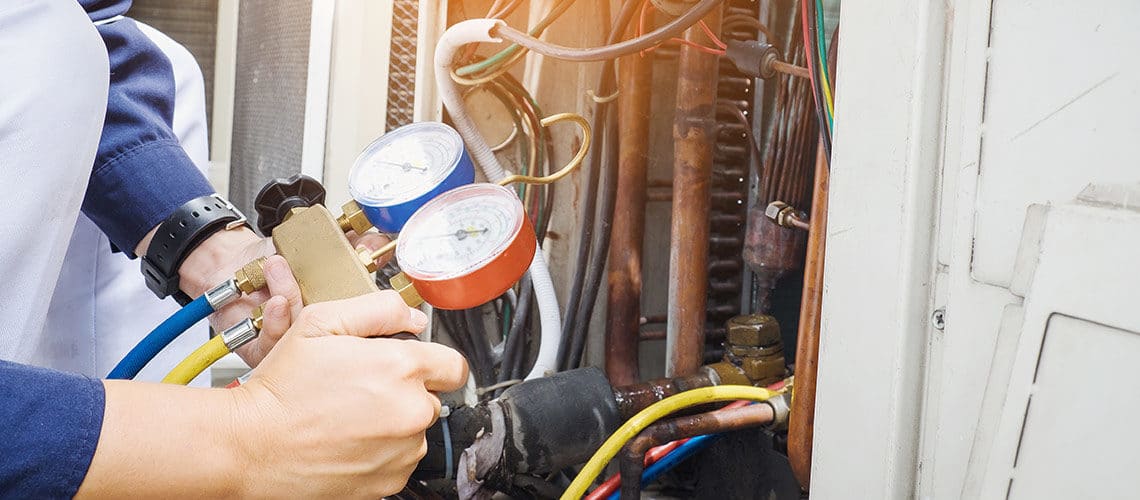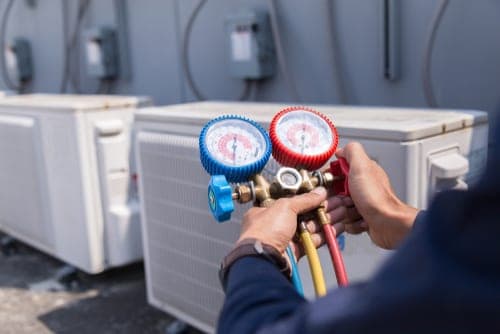Energy-Efficient Cooling And Heating Equipments to Minimize Utility Bills
As power prices proceed to increase, the value of energy-efficient HVAC systems ends up being increasingly evident. These systems not only assure significant cost savings on utility expenses yet likewise add to a more sustainable future by decreasing power consumption.
Advantages of Energy-Efficient HVAC Systems
Energy-efficient a/c systems supply countless benefits that extend past mere price savings. One significant benefit is the decreased environmental effect. By consuming less energy, these systems add to lower greenhouse gas discharges, helping to deal with climate change and advertise sustainability. This lines up with raising societal needs for eco-friendly techniques in domestic and commercial settings.
Additionally, energy-efficient a/c systems frequently offer boosted convenience levels. Much of these systems include advanced technology that enables much better temperature control and boosted air top quality (DMAKS HVAC). This causes a healthier interior atmosphere, which is particularly essential for individuals with allergic reactions or respiratory system concerns
Moreover, purchasing energy-efficient cooling and heating systems can enhance building worth. As even more consumers prioritize energy effectiveness, homes and buildings geared up with these systems may attract greater quotes in the genuine estate market.
Sorts Of Energy-Efficient A/c Options
Exactly how can home owners and organizations choose one of the most appropriate energy-efficient heating and cooling alternatives for their requirements? The market offers a variety of energy-efficient heating and cooling systems, each designed to enhance comfort while lessening energy consumption.
One option is the variable refrigerant circulation (VRF) system, which effectively manages the temperature level in several zones within a building. This system adjusts its cooling agent circulation to match the wanted temperature level, causing significant energy financial savings.
Another popular selection is geothermal heatpump, which make use of the planet's secure temperature to warmth and amazing areas. By moving warm to and from the ground, these systems show remarkable performance, specifically in moderate environments.
Furthermore, ductless mini-split systems supply an energy-efficient choice for homes doing not have ductwork. These systems enable zone-specific cooling and heating, lowering energy waste in unoccupied locations.
Last but not least, high-efficiency heaters and a/c, with innovative SEER and AFUE rankings, offer dependable environment control while taking in less energy than typical versions. By examining these options, property owners and businesses can pick a heating and cooling system tailored to their specific needs and power performance objectives.
Key Attributes to Consider

Next, examine the kind of compressor used in the system. DMAKS HVAC. Variable-speed compressors can adjust their outcome to match the home heating or cooling need, bring about enhanced comfort and power cost savings compared to single-speed models. In addition, try to find systems furnished with wise thermostats that provide programmable setups and remote accessibility, permitting for better control over energy usage
Another vital attribute is the system's air filtering ability. High-efficiency filters can enhance indoor his response air top quality and reduce power intake by guaranteeing the system runs effectively. In addition, take into consideration the kind of cooling agent used; modern-day systems usually utilize environmentally friendly refrigerants that have a reduced ecological effect.
Last but not least, make certain that the system is suitable with zoning technology, which enables tailored temperature control in various locations of your home, boosting comfort while minimizing energy use.
Tips for Picking the Right System


Following, consider energy efficiency ratings, particularly the Seasonal Energy Efficiency Proportion (SEER) for cooling down systems and the Annual Gas Application Efficiency (AFUE) for heating unit. Higher scores show higher performance, which can result in substantial financial savings on utility expenses gradually.
Additionally, examine the kind of cooling and heating system that finest fits your way of life and spending plan. Options include air conditioning, ductless mini-splits, and warm pumps, each with its own set of advantages and downsides.
Do not neglect the importance of appropriate installment and sizing; an inaccurately sized system can lead to inadequacies and enhanced wear. Last but not least, seek advice from a professional heating and cooling service provider to get professional recommendations customized to your home's special demands. This thorough method will guarantee that you pick an energy-efficient HVAC system that fulfills your needs and spending plan successfully.
Upkeep for Optimum Efficiency
As soon as the best a/c system remains in location, recurring maintenance becomes crucial to making sure ideal performance and long life. A well-kept system runs more efficiently, resulting in lower power consumption and lowered utility bills. Routine examinations and tune-ups need to be set up a minimum of two times a year-- when prior to the cooling season and when prior to the heating period.

Home owners ought to likewise be vigilant concerning checking their cooling and heating system's efficiency. Uncommon noises, fluctuating temperature levels, or raised energy costs can show underlying issues that need prompt attention. By dealing with these issues promptly, house owners can avoid pricey fixings and expand the lifespan of their systems.
Investing in an upkeep strategy with a certified professional not just boosts efficiency but likewise offers assurance, understanding that the system is running at its best. DMAKS HVAC. Normal upkeep is as a result crucial for maintaining power efficiency and minimizing total functional costs
Final Thought
To conclude, energy-efficient a/c systems present a viable option for lowering utility expenses while improving comfort and air quality. By integrating advanced innovations and choices such as geothermal heatpump and ductless mini-splits, homeowner can achieve considerable energy financial savings and add to environmental sustainability. Careful factor to consider of system attributes moved here and recurring upkeep additionally ensures ideal performance, making energy-efficient systems a sensible investment for both economic and eco-friendly benefits.